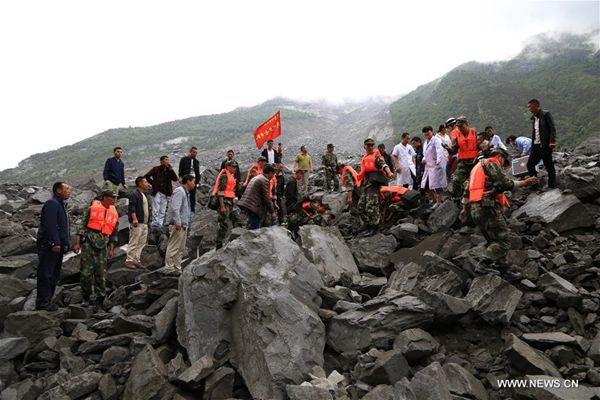15 found dead in SW China landslide burying 120
 |
|
Rescuers work at the accident site after a landslide occurred in Xinmo Village of Maoxian County, Tibetan and Qiang Autonomous Prefecture, southwest China’s Sichuan Province, June 24, 2017. The landslide on Saturday morning smashed some 40 homes, where about 100 people are feared to be buried. (Xinhua/He Qinghai) |
Fifteen people have been confirmed dead in a landslide in southwest China’s Sichuan Province early Saturday that buried more than 120 people from 62 homes.
Rescuers had retrieved 15 bodies from the debris by 10 p.m. Saturday, the rescue headquarters said.
The search and rescue operation was underway overnight and people have been sent to observe potential secondary disasters.
Rescuers were combing the area with life detectors and sniffer dogs but no new signs of life have been found.
“We won’t give up as long as there is a slim of chance,” said one rescuer.
Xu Zhiwen, executive deputy governor of the Tibetan and Qiang Autonomous Prefecture of Aba that the landslide stuck, said the identities of 118 missing will be soon made public on the government’s website.
Xu also cleared up worries that some tourists might be among the buried as the village is in a tourist site.
All 142 tourists that entered the site Friday have been reached, said Xu.
The landslide from a high part of a mountain in Aba prefecture hit Xinmo Village in Maoxian County at about 6 a.m., blocking a 2-km section of river and burying 1,600 meters of road.
The provincial government has launched the highest level of disaster relief response and sent rescue teams to the site.
Currently, more than 3,000 workers with life-detection instruments are engaged in the search for survivors.
The provincial department of land and resources said the landslide was caused by heavy rain. An estimated 18 million cubic meters of earth mass fell some 1,600 meters, engulfing half of Xinmo Village. Geological experts at the site said the chance of survival for the people buried was really slim.
Only three people from one family were rescued five hours after the landslide struck. They were taken to Maoxian County People’s Hospital and none suffered life-threatening injuries. Another three-year-old child of the family remains buried.
Qiao Dashuai, 26-year-old husband of the family, recalled that he and his wife woke up to cries of their one-month-old son at about 5:30 a.m.
“Just after we changed the diaper for the baby, we heard a big bang outside and the light went out,” said Qiao. “We felt that something bad was happening and immediately rushed to the door, but the door was blocked by mud and rocks.”
The husband and wife mainly suffered bruises and their one-month-old son was being treated for pneumonia as he inhaled muddy water.
“I arrived at the site at 7:30 a.m. and found that the whole area was buried by the landslide,” said He Dajun, a worker with Maoxian County Power Company.
Another 110 people living nearby in another part of the village were being evacuated to a township school on Saturday night, fearing there might be rain and secondary disasters.
The village was relocated to the current site in 1976 as their previous location was prone to landslides and since then, villagers have been living in two groups in nearby locations.